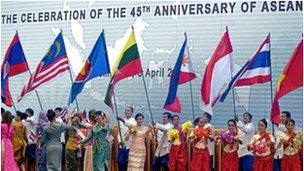Asean single currency unlikely after eurozone 'lesson'
- Published

The 10 countries that make up Asean reiterated commitment to a common market by 2015
The Association of Southeast Asian Nations (Asean) has never enjoyed the most dynamic image.
Its annual summit has been described as a "talking shop" by at least one international news service. But this week's meeting of the 10 member countries in Phnom Penh felt perhaps a little punchier than usual.
Such is the confidence coursing through the region that it is now fashionable to poke fun at the woes of longer-established trading blocks.
At the weekend's Asean-EU Business Summit, which acted as an hors d'oeuvre for this week's main course, schadenfreude momentarily overcame hospitality as the speeches took place.
"In 1997 the EU told us 'put your house in order'," said Asean Secretary General Surin Pitsuwan in reply to a speech by the European trade commissioner.
"This time," he continued, to loud applause, "we appeal to Europe: put your house in order."
Rapid change
The eurozone's travails have been keenly observed in this part of the world.
Asean was always going to follow a different approach from the EU. But the eurozone experience has been what Indonesian Trade Minister Gita Wirjawan calls "a lesson" for people around the world - and not one which governments in South East Asia are in any rush to replicate.
"That's a situation that we hopefully don't have to deal with. We have been somewhat prudent - and this prudence didn't come from the sky, it came from a very difficult and traumatic experience at the peak of the financial crisis in 1998. We decided to remedy ourselves and make sure that we would continue more carefully. "
Although the regional grouping of 10 countries has a history stretching back to the late 1960s, a formal charter was adopted only four years ago, belatedly giving the association a legal framework.
But the region is changing rapidly - along with the individual countries in Asean.
South East Asian nations boast some of the world's fastest-growing economies. Vibrant democracies have taken root in two of the largest member states, Indonesia and the Philippines. And Burma is the latest to take steps towards reform.
At the summit, Asean leaders reaffirmed their commitment to achieve economic integration by 2015 - but the idea of a regional single currency is a long way from the thoughts of the key players.
Common currency?
.jpg)
There are extreme differences in wealth between countries in the Asean bloc
"We're not saying it's a bad idea, but it's never quite been a topic for us," says Mr Wirjawan.
To some degree, many South East Asian countries already have a common currency: the US dollar.
The greenback is the most widely-used form of payment in the Asean summit's host nation, Cambodia, and it is widely accepted in other countries.
But Mr Wirjawan says that formal dollarisation is out of the question: "People's familiarity with the US dollar doesn't mean that's a direction that Asean would take."
There are considerable obstacles in the way of developing a single currency for Asean. As the eurozone crisis has shown, problems in a weak economy can swiftly make trouble for the stronger performers.
But gap between Greece and Germany is far narrower than the yawning economic chasm which currently separates Cambodia - one of the world's least-developed countries - and Singapore, which is one of the wealthiest.
So instead of looking towards a single currency, Asean first has to focus on its 2015 goal for economic integration. And even that is an extremely ambitious target.
"A single currency is not the primary objective," says Arjun Goswani, director of regional co-operation for the Asian Development Bank's South East Asia department.
Stronger Asean
"Asean takes its own path towards regional cooperation - it's not a carbon copy of Europe," he adds.
"All these building blocks of institutional and person-to-person connectivity need to be put in place first, to build a market, build co-operation - between customs, for instance. These are much more important objectives."
Mr Goswani believes the gaps between Asean countries will reduce naturally over time, as the faster growth rates of the least developed countries allow them to catch up with their wealthier counterparts.
But first, they need to sort out the basics which will allow them to present Asean as a unified block: logistics, urban development and trade facilitation.
"The stronger the Asean foundation is, the stronger the overall Asian co-operation process - and the more advantage the Asean countries can take of the other large economies in Asia."
Once again, the 10 countries used the summit to emphasise their commitment to the 2015 target for an Asean common market. It will mean many - and rapid - changes.
But, it seems, a single currency will not be among them.
- Published20 March 2012
- Published3 April 2012